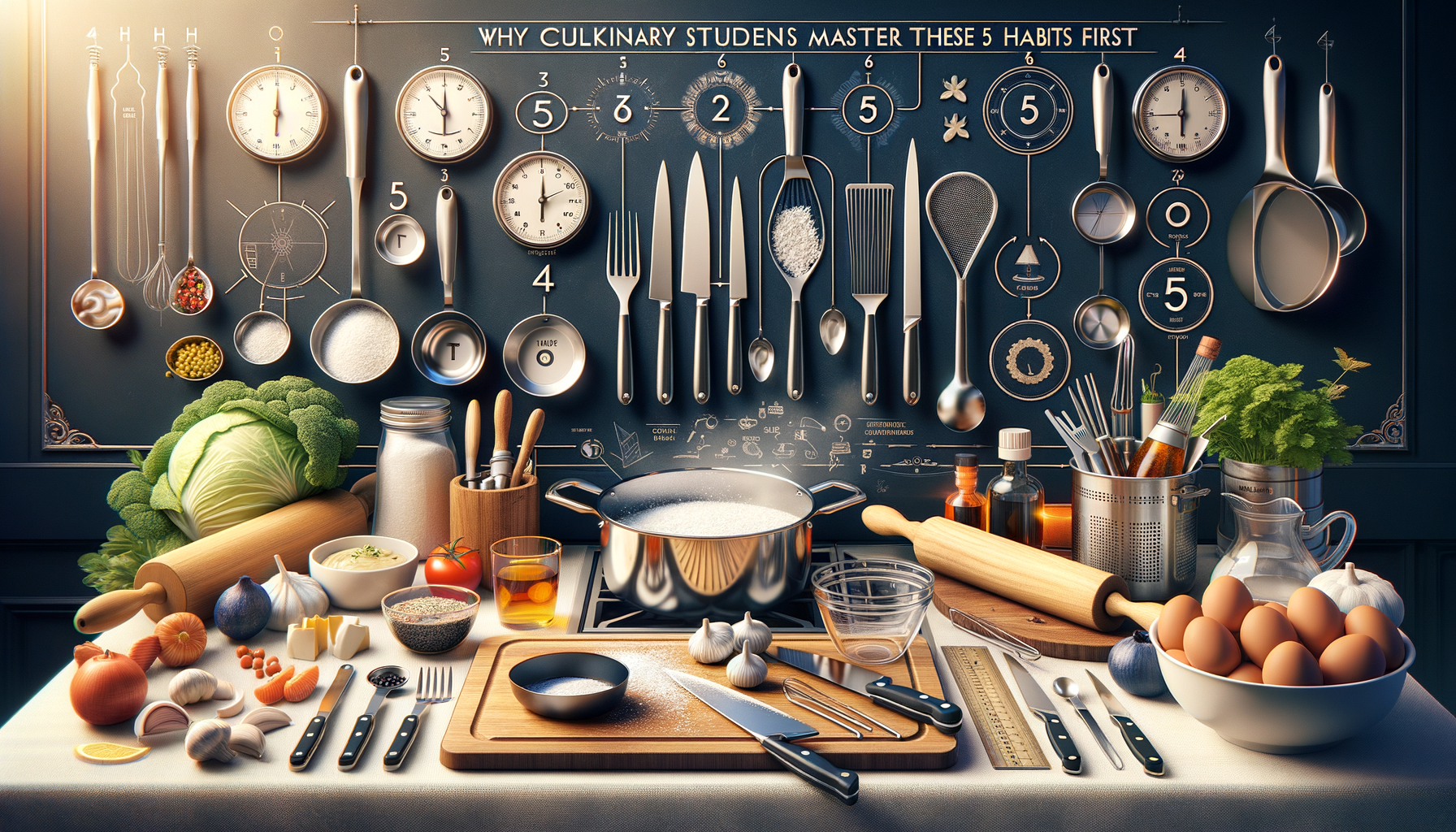Why Culinary Students Master These 5 Habits First
These practices are simple, repeatable, and help create a strong kitchen foundation.

Introduction to Essential Cooking Habits
Cooking is an art that combines creativity with precision, and mastering it requires dedication and practice. For culinary students, developing foundational habits is crucial to their success in the kitchen. These practices are simple, repeatable, and help create a strong kitchen foundation. Whether you’re a budding chef or a home cook, incorporating these habits can enhance your culinary skills and make your cooking experience more enjoyable.
Mise en Place: The Foundation of Cooking
Mise en place, a French term meaning „everything in its place,“ is a fundamental practice in professional kitchens. It involves preparing and organizing all ingredients and tools before cooking. This habit ensures efficiency and reduces the risk of errors during the cooking process. Culinary students learn to appreciate the value of mise en place as it allows them to focus on the cooking techniques rather than scrambling for ingredients.
By adopting this habit, you can streamline your cooking process and enhance your culinary skills. Here are some steps to implement mise en place in your kitchen:
- Read through the entire recipe before starting.
- Measure and prepare all ingredients in advance.
- Organize tools and equipment for easy access.
- Clean as you go to maintain a tidy workspace.
These practices not only improve efficiency but also help in maintaining consistency in your cooking.
Knife Skills: Precision and Safety in the Kitchen
Knife skills are essential for any aspiring chef. Culinary students spend significant time honing their ability to chop, dice, and slice with precision. Mastering these skills not only improves the presentation of dishes but also enhances safety in the kitchen. Proper knife techniques can prevent accidents and ensure that ingredients are cut uniformly, which affects cooking times and the final dish quality.
To develop exceptional knife skills, consider the following tips:
- Invest in a high-quality chef’s knife and keep it sharp.
- Learn different cutting techniques such as julienne, chiffonade, and brunoise.
- Practice proper hand positioning to avoid injuries.
- Regularly practice cutting different types of ingredients.
By focusing on these aspects, you can improve your efficiency and confidence in the kitchen.
Tasting and Seasoning: The Art of Flavor Balancing
One of the key habits culinary students develop is the ability to taste and season their dishes effectively. Understanding how to balance flavors is crucial for creating dishes that delight the palate. This skill involves recognizing when a dish needs more salt, acidity, or sweetness to achieve a harmonious flavor profile.
Here are some strategies to enhance your tasting and seasoning skills:
- Taste your dish at different stages of cooking.
- Experiment with different herbs and spices to discover new flavor combinations.
- Learn to identify the basic tastes: sweet, salty, sour, bitter, and umami.
- Adjust seasoning gradually to avoid over-seasoning.
By incorporating these practices, you can elevate your dishes and impress your guests with well-balanced flavors.
Time Management: Efficiency in the Kitchen
Effective time management is a critical skill for culinary students and professionals alike. Managing time efficiently ensures that dishes are prepared and served promptly, maintaining their quality and freshness. Culinary students learn to prioritize tasks, multitask, and work under pressure to meet deadlines.
To improve your time management skills in the kitchen, consider the following tips:
- Create a cooking schedule and stick to it.
- Prepare ingredients and tools ahead of time.
- Utilize downtime effectively, such as cleaning while waiting for a dish to cook.
- Practice cooking multiple dishes simultaneously to improve multitasking abilities.
By mastering time management, you can enhance your productivity and efficiency in the kitchen.
Conclusion: Building a Strong Culinary Foundation
Incorporating these essential habits into your cooking routine can significantly enhance your culinary skills and experience. Whether you’re a culinary student or a home cook, mastering mise en place, knife skills, tasting and seasoning, and time management will set you on the path to success in the kitchen. These practices not only improve efficiency but also contribute to the creation of delicious and well-presented dishes. By focusing on these foundational skills, you can build a strong culinary foundation and enjoy the art of cooking to its fullest.